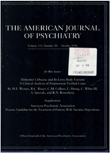Early brain trauma and schizophrenia in Nigerian patients
Abstract
OBJECTIVE: A number of reports have suggested that early brain trauma, especially obstetric complications, may be associated with schizophrenia. This observation seems at variance with the similar rates of schizophrenia reported for advanced and developing countries when viewed against the high rate of perinatal morbidity in developing countries. Using patients with mania as comparison subjects, the authors investigated the association of early brain trauma with schizophrenia in adult life among Nigerian patients. METHOD: The manic (N = 12) and schizophrenic (N = 26) groups, both diagnosed according to the Research Diagnostic Criteria, were compared in respect to the prevalence of events commonly regarded as definite obstetric complications and the prevalence of childhood brain injury for which hospitalization was required. RESULTS: A history of early brain trauma was associated with an adult diagnosis of schizophrenia. Schizophrenic patients with a history of early brain trauma were more likely than those without early brain trauma to have shown poor scholastic performance in childhood. They also showed mixed cerebral laterality in adulthood. CONCLUSIONS: Early brain trauma may be a specific risk factor for the later development of schizophrenia. Patients with such a history may evidence other features of neurodevelopmental deviance.
Access content
To read the fulltext, please use one of the options below to sign in or purchase access.- Personal login
- Institutional Login
- Sign in via OpenAthens
- Register for access
-
Please login/register if you wish to pair your device and check access availability.
Not a subscriber?
PsychiatryOnline subscription options offer access to the DSM-5 library, books, journals, CME, and patient resources. This all-in-one virtual library provides psychiatrists and mental health professionals with key resources for diagnosis, treatment, research, and professional development.
Need more help? PsychiatryOnline Customer Service may be reached by emailing [email protected] or by calling 800-368-5777 (in the U.S.) or 703-907-7322 (outside the U.S.).



